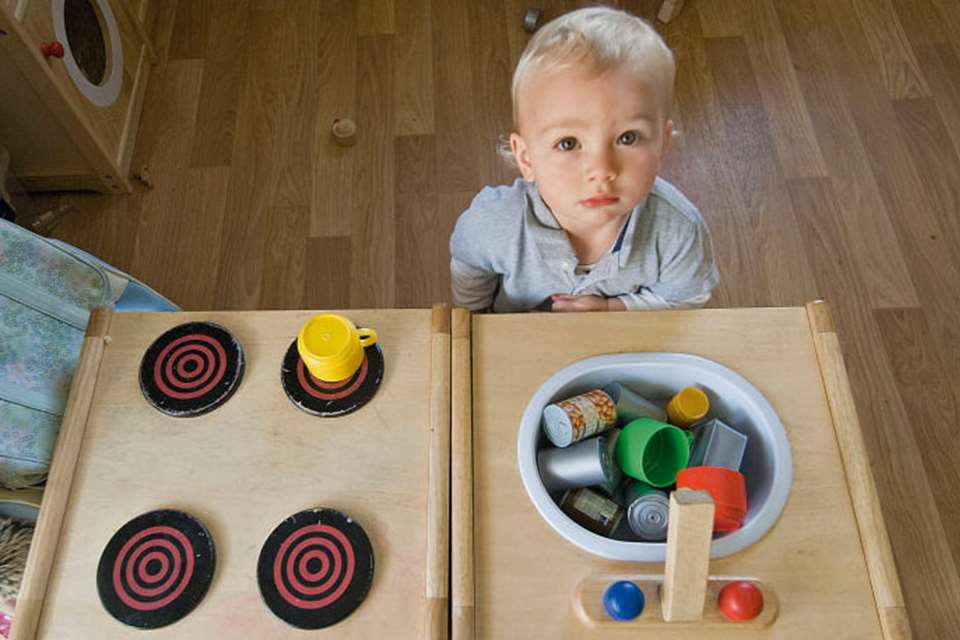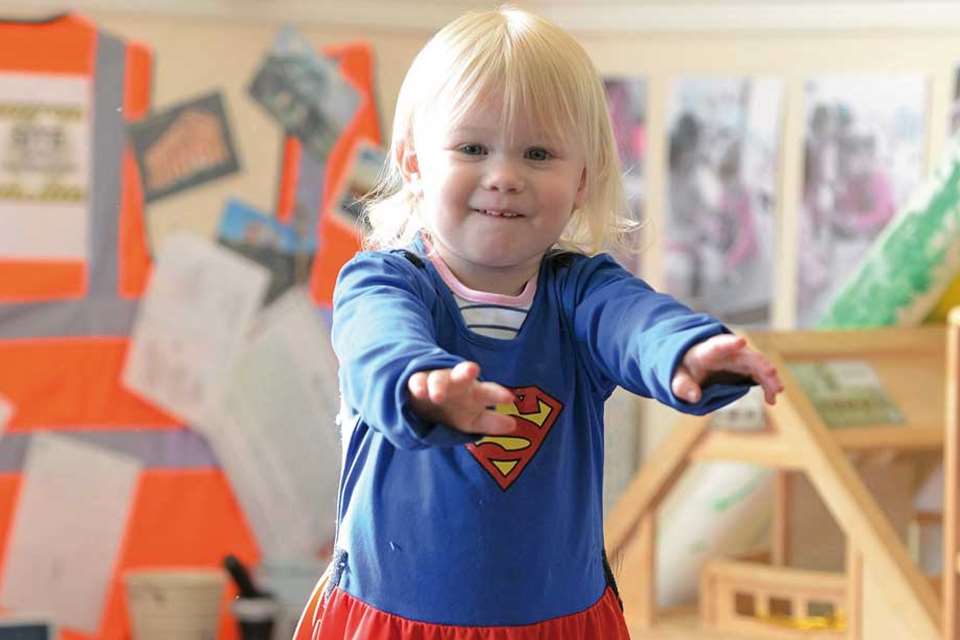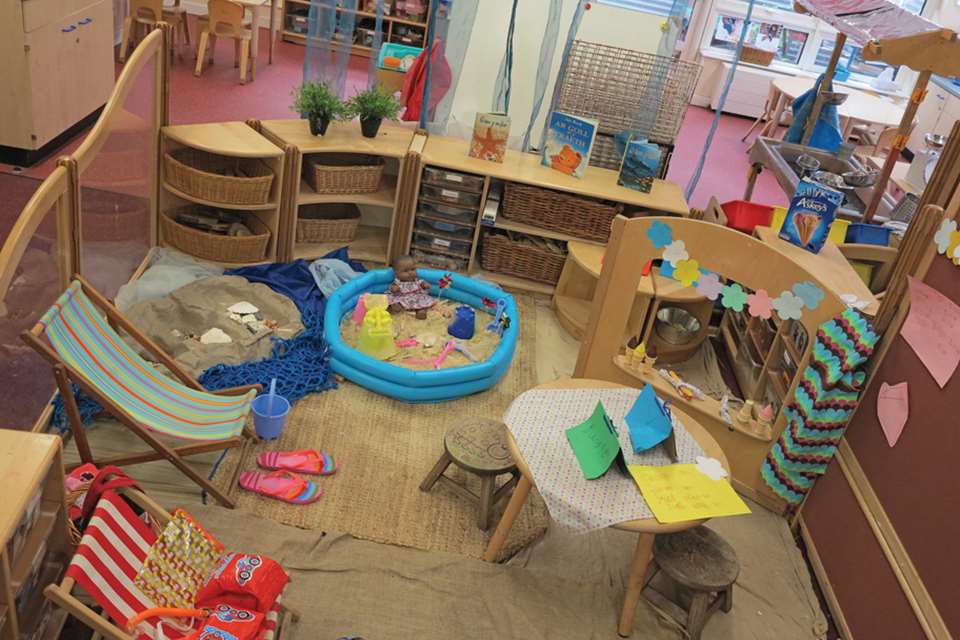EYFS best practice in schools: Role play - Home and away
Charlotte Goddard
Monday, January 21, 2019
Even the youngest children role play, but the activity takes on whole new meanings and imaginative potential with Reception pupils, explains Charlotte Goddard

Download the PDF of this article
Whether it is playing mothers and fathers in the home or superheroes battling villains in a magical land, role play has always been a crucial part of children’s play and development. Schools are increasingly aware of the importance of this kind of imaginative play, and opportunities for it have opened up as settings dedicate more time to outdoor play. However, schools also face barriers in their delivery of this vital part of provision.
‘Although there have been some real developments in practice because of the outdoor emphasis, there is still pressure to develop the school readiness agenda,’ says Professor Sue Rogers at the Institute of Education, University College London.
‘Opportunities for play are getting smaller in some schools,’ agrees early years trainer Alistair Bryce-Clegg. ‘Once you have done the register, then phonics, then assembly, then PE, play is squeezed. In lots of places, the issue is thinking that attainment happens only through adult-led, table-top activities.’
BENEFITS OF ROLE PLAY
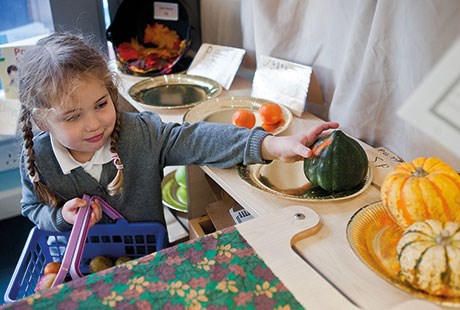
Even young babies engage in mimicry and imitative play, but by around the age of four, children’s imaginative play becomes more complex, expanding a simple premise like a birthday party with their own experience and imagination. Their creativity, detail, use of language and social interaction are all increasing significantly.
‘Very young children need more props in their play, and these must be realistic – they do a lot of imitative play and are just beginning to imagine that a banana is a telephone, for example,’ says Professor Rogers. ‘As they move into Reception, more open-ended resources come into their own and their imagination and social skills develop so they can imagine what it is like to be someone else.
‘Their play becomes richer as they are able to combine their own experiences with those of other children.’
The benefits of role play include the development of:
- imagination and storytelling
- problem-solving skills
- understanding of mathematical concepts
- language and communication
- self-regulation through negotiation, co-operation and conflict resolution as children agree the roles and rules of play
- gross and fine motor skills.
Role play also enables children to:
- take risks in a safe environment
- express feelings
- learn about other cultures
- engage in sustained shared thinking.
Role play is particularly important for a child’s social and personal development. ‘There is a social dimension to role play, as the best role play is with others – you learn social skills around taking another person’s perspective,’ says Professor Rogers.
‘By the age of four or five, children understand that if they don’t play by the rules being set up in the fantasy game, their friends won’t want to play any more, so there is learning around behaviour and social interaction as well as storytelling and the language it might reveal.’
Judith Twani, assistant head teacher and associate of Early Excellence, believes role play is especially important for children learning English as an additional language. ‘A home corner can provide real everyday vocabulary for them to get hold of and use in a relaxed way,’ she says. ‘For quiet children, the home corner can also be a place they feel comfortable.’
Role-play environments
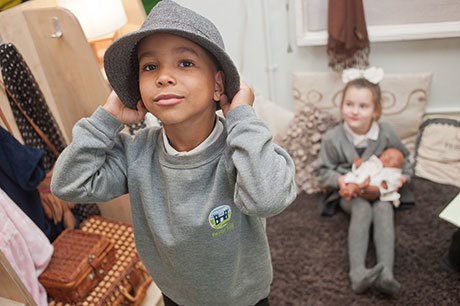
Role play provides an invaluable means for children to consolidate their understanding of knowledge and skills through meaningful experiences, or to try out new ideas in a safe and familiar environment.
When considering how to plan and resource role-play areas, Jan Dubiel, national director of Early Excellence, believes settings need to focus on children’s interests and experiences and acknowledge also their responsibility in introducing new ideas and situations in meaningful ways.
‘Children cannot develop an interest in something that they don’t know about,’ he says. ‘Some children start school with very limited experiences, and practitioners have a role to play in broadening and deepening their experiences, so there are opportunities – and responsibilities – for extending children’s experiences and knowledge of the world around them.’
It is also important to recognise that children will constantly want to play out scenarios that may be inspired by, say, recent experiences, books or computer games. So, says Mr Dubiel, ‘It’s vital that settings provide well-equipped continuous provision, including lots of open-ended resources, such as blocks and loose parts, so children have the spaces and means to create scenarios that support and extend their learning, understanding and knowledge.’
Thoughtful resourcing enables practitioners to maximise the learning opportunities within children’s role-play scenarios. ‘In the home corner, you can include a timer, clock, different types of measuring cups, so it is reflecting how maths is used in real life,’ says Ms Twani.
‘Have the book area next to the home corner so it looks like a lounge, with a couch and uplighter, and children engage emotionally with it as part of the home corner experience. Include recipe books, and catalogues, and have a whiteboard on the fridge, a calendar on the wall, providing writing opportunities that are meaningful. In terms of technology, think about providing little angle lamps, or even a little vacuum cleaner that really works.’
The role of the adult
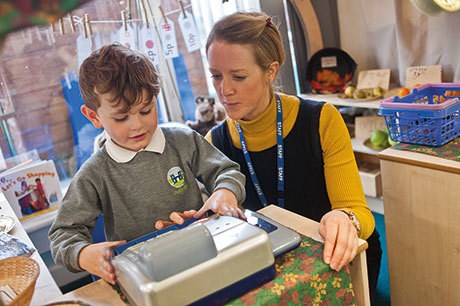
Whatever the theme and resources, the potential of this kind of creative play hinges on the adult role. ‘Teaching maths using interesting resources in the home corner is perfectly justifiable but not necessarily what we mean by role-play,’ says Professor Rogers.
A more powerful role is to let the child take the lead. She adds, ‘Put aside the adult agenda. Listen to them, give them scaffolding if they need it around social interaction issues, and maybe inject the odd idea or prop, but don’t dominate – that is a real skill.’
Adults need to recognise too when not to interfere in children’s play. ‘If you can see a child is immersed and in character, there is no need for us to interfere,’ says Sherise Richardson, vice-principal at Castle Hill Infant School in Suffolk.
Far better sometimes to just observe, says Professor Rogers. ‘You get a lot of insight into a child’s speech and language development, and you may be able to pick up on their interests for learning opportunities later on.’
Home corner
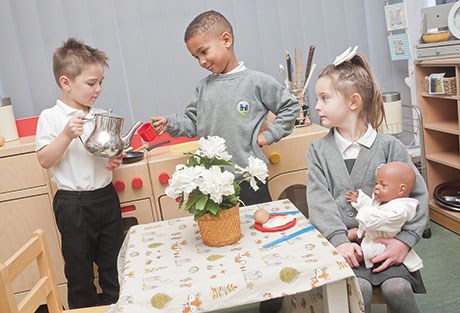
Rightly, the home corner is often the cornerstone of classroom role-play. Early years teachers can feel pressure from senior leadership to change it to a travel agent’s or a café depending on the term’s topic, but a permanent home corner is important, says Ms Twani.
‘Home is the one thing all children have in common,’ she explains. ‘It is better to have a permanent home corner which you enhance, so it becomes a home celebrating Chinese New Year, rather than a Chinese restaurant.’
While home corners stocked with very open-ended resources are becoming more popular, Ms Twani prefers well-equipped realistic home corners over deconstructed versions. ‘I rarely see them done well,’ she says. ‘Of course, every classroom needs to have things children can create from loose parts, and we know children will create their own role play from these open-ended resources, but I’d rather have fabrics, tubes and so on as well as a home corner, not instead of.’
Themed role play
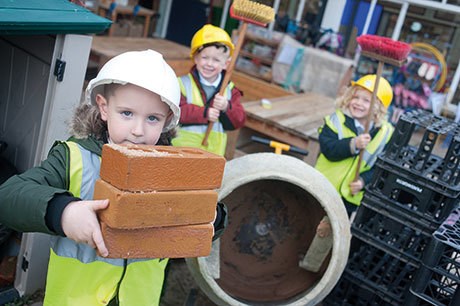
Specific themed role-play areas, such as a doctor’s, dentist or shop, can be created in response to children’s current interests or experiences. Continuous provision can also be enhanced easily to reflect their interests.
‘Again, there is a responsibility to be more proactive here,’ says Mr Dubiel. ‘An estate agent might not be somewhere a child has been nor understands. Visiting one in the locality would both broaden the child’s experience and also enhance the level of play within it because it would have a real “experienced” context.
‘Have a box of hairdressing resources, a pets’ box, a box of summer things,’ says Ms Twani. ‘And have coats, hats and wellies, not fairies and superheroes, otherwise they become obsessed with being princesses and that detracts from everything else going on. You can give them all the dressing-up clothes, but in the appropriate place.’
Role play outdoors shouldn’t be overlooked. ‘You can have a building site outside with hard hats and jackets, you can create roadways based on the local community – that’s good for road safety training as well,’ says Ms Twani. ‘You can have children take driving lessons, pass their test – maybe even get points on their licence!’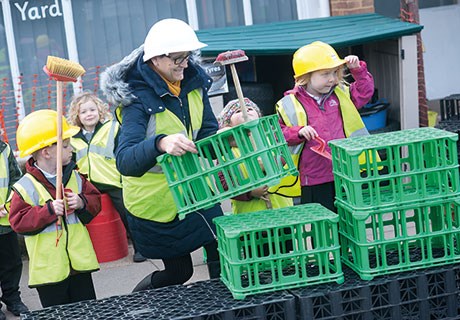
Fantasy play
Fantasy play is particularly popular with Reception-age children who can experiment with building wonderful scenarios while still being secure in who they are.
‘They might be playing Paw Patrol non-stop, or pirates, but you end up with a rich and ever-shifting scene, with a developing narrative that may not make sense but is probably one of the most powerful kinds of role-play,’ says Professor Rogers. ‘We don’t provide many experiences for this in the classroom as it is hard to manage in a limited space.’
One aspect of fantasy play that can cause concern to practitioners is superhero and weapon play. ‘It is a normal part of development,’ says Mr Bryce-Clegg. ‘When you look at the motivation it is about relationships and power play.’
Children will always push boundaries in their play and want to explore the darker side of life, says Professor Rogers. ‘While we shouldn’t be encouraging violence in the classroom, zero tolerance is not the most productive approach,’ she says.
‘If superhero play or fighting using weapons emerges, it can be used as a way of talking about how we interact with each other. You need to have very observant practitioners to manage it in case there is a power imbalance.’
Ms Twani observed a practitioner respond effectively to weapon play by getting in the line of fire and ‘dying’ in a spectacular manner. The children stopped and shifted their role play to that of emergency services, ringing for the police and ambulance.
Small-world play
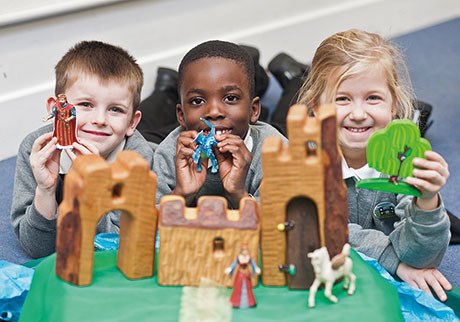
Small-world play has some similarities to role play, but also some differences. ‘Small-world play is not role play because the child is not taking on a role, it is more about them being in control,’ says Ms Twani. ‘For example, one little boy lost his dad, and when he was given small-world doctors and nurses, he buried them in the sand – he was controlling them, not becoming them.’
As with role play, practitioners can provide well-resourced environments that reflect current interests. However, children should also have access to open-ended resources that enable them to create scenarios of their choosing. The temptation might be to create beautiful scenes from Pinterest, but children’s play and thinking need always to have priority. At one school, a teacher removed a carefully created small-world jungle because children were not playing with it ‘properly’.
CASE STUDIES
Castle Hill Infant School, Ipswich, Suffolk
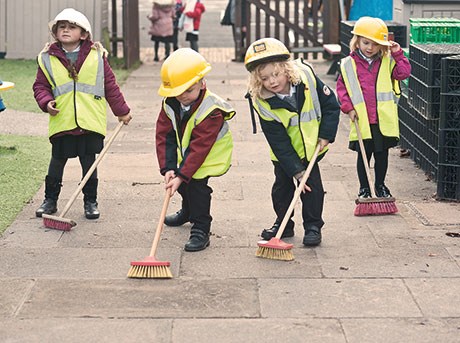
Castle Hill Infant School has a permanent home corner in one of its three Reception classrooms. ‘We have a very high number of children on Pupil Premium,’ says Ms Richardson. ‘Children may be getting limited experiences outside school, so we want to give them more in school. They may not know how to access elaborate role play like a castle or an ice-cream parlour – they have never been exposed to these things – but they are able to relate to a home corner.
‘Every child can act out some element of home, including children with English as an additional language, or those with special needs: they are able to access play even if they can’t verbalise or socialise.’
Parents donate items to keep the home corner stocked and teachers also scour charity shops. The corner is decorated throughout the year to reflect changing seasons and celebrations, but its core remains the same.
‘We try to put different things in there to reflect everybody’s life,’ says Ms Richardson. ‘Children with an Indian background will not always use cutlery, for example, so we have the kind of plates they would use at home for finger food.’
While the home corner is the cornerstone of role play, other opportunities are available. ‘We still have themed role-playing areas,’ says Ms Richardson. ‘We made a superhero tower, for example, and we have a workshop outside, with tools, and a Wendy house.’
Role play helps boost children’s confidence and self-esteem, says Ms Richardson. ‘We have got children who are shy and don’t want to speak in class, but being in role changes that. If they are in role and you are playing with them, they don’t see you as a teacher, you are in that co-operative play stage with them.
‘We have also got children with separation anxiety: they don’t like leaving home or school once they are here. In the last few days, one child dressed as a police officer and their confidence increased because they were in role.’
The school also has a nurture classroom with its own home corner. There children, under the supervision of a practitioner trained in Trauma-Informed Practice, can use role play to help children manage their feelings and explore how they handled situations with their friends.
Now the early years team is sharing its skills with KS1 staff. Ms Richardson says, ‘Years 1 and 2 have free-flow role-play areas as well, and we have been training other staff members on the importance of role play.’
John Ray Infants School, Braintree, Essex
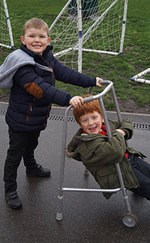
In the playground at John Ray Infants School, some children are playing with phones and keyboards, pretending they work in the school office. Others are using Zimmer frames and walking sticks in their pretend play, trying out what it is like to be older people.
John Ray received £10,000 from the National Lottery in 2017 to fund the development of a PlayPod project, with the school contributing a further £6,000 from its own budget. Provided by the Children’s Scrapstore organisation, PlayPods hold a range of scrap materials such as cardboard tubes, tyres, netting and ropes, as well as equipment such as old computer keyboards and suitcases.
‘The idea was to enhance lunchtime opportunities for children around role play,’ says head teacher Kate Mills. ‘There are also enhanced opportunities for children to play across year groups. We recognise our Foundation children get lots of opportunities for role play in class, but Key Stage 1 less so. A lovely thing we see is Foundation children do lots of teaching older children about den-building, for example.’
The charity tops up the items regularly and provides training. ‘Midday staff, parents and children received training from the PlayPod scheme and then we get an annual review for staff and children from the same team,’ says Ms Mills.
The PlayPod can also be used for classroom role play, which is generally themed around topics. ‘We visited the fire station so then we built our own fire station in the classroom using some of the stuff from the PlayPod,’ explains Ms Mills. ‘We try to develop the children’s language through this kind of role play.’
St Mary’s Catholic Primary School, Hornchurch, London
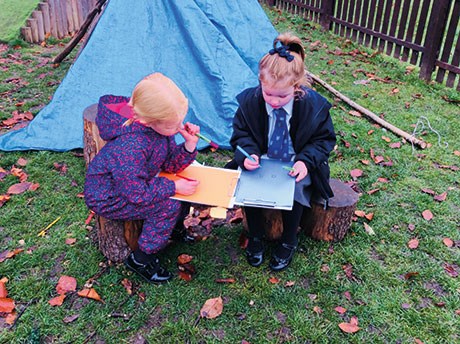
At St Mary’s Primary a new baby has arrived. The home corner has banners and cards up welcoming the new arrival, and since St Mary’s is a faith school, the priest has come to baptise the baby. It’s all make-believe but it is a familiar scenario for many of the Reception children and is one of many ways in which the permanent home corner can be enhanced during the year.
St Mary’s operates a free-flow system allowing Reception children to access the home corner at any time. ‘Children are in there a lot,’ says Reception class teacher Louise Robinson. ‘We put the fruit from our fruit scheme in there, so if they are hungry they can go in and get a snack. We include peelers and knives so play becomes more real, and they can chop up their own food.’
The home corner is popular with boys and girls alike, says Ms Robinson. ‘The boys often like to play with pretend pets in there. It is always busy. Children’s main experience is what they see in the home, so a lot of their play is domestic.’
The corner aims to be inclusive. ‘One boy has two mums, so when he role-plays he wants two mums,’ says Ms Robinson. ‘We have photos of all kinds of families and say families can be what you want them to be.’
The school views the environment as its ‘third teacher’. ‘Learning just happens naturally in a developmentally appropriate way,’ says Ms Robinson. ‘Outside there is a huge sandpit, and children often play at being builders or archaeologists, and there is a mud kitchen – the whole environment supports role play.’
Adults spend time with the children, scaffolding their play. ‘I was in the home corner today,’ says Ms Robinson. ‘A little boy said the dog is on the sofa, that is not allowed. I asked him what we could do, and he decided to make a dog bed, so we got some fluff and I supported him on how to put it together.’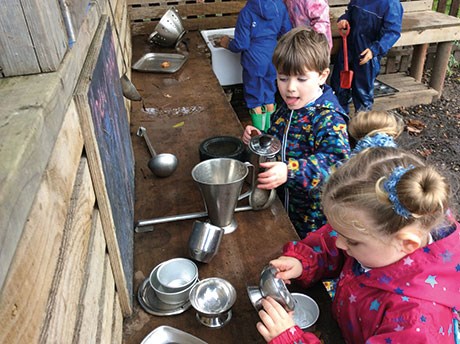
FURTHER READING
- Creative Role Play in the Early Years: How to Plan Stimulating and Exciting Role Play, Inside and Out! by Alastair Bryce-Clegg. Featherstone Education
- ‘Rethinking role-play in the Reception class’ by Sue Rogers and Julie Evans, Educational Research, 49 (2)
- Inside Role-Play in Early Childhood Education: Researching Young Children’s Perspectives by Sue Rogers and Julie Evans. Routledge



